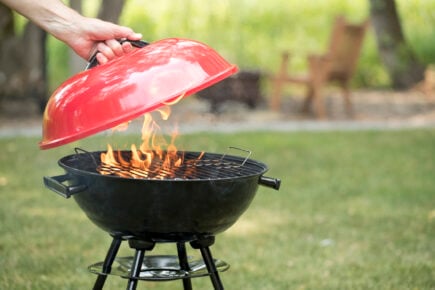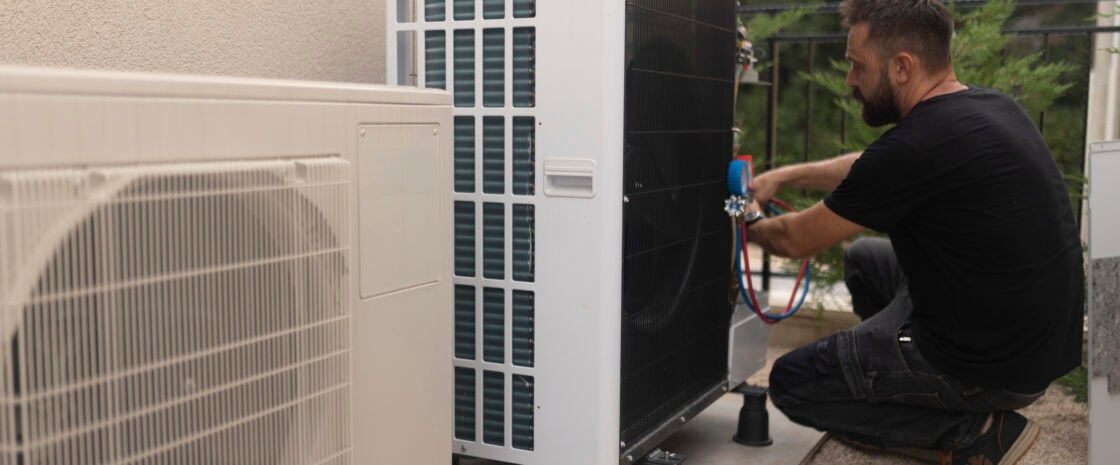In Canada’s climate, having a good source of home heating is essential, with most households opting for furnaces, electric baseboards or boilers to keep their spaces warm during the winter.
A heat pump is another way to heat — and cool — your space. According to Natural Resources Canada (NRC), around 7% of Canadian homes reported using heat pumps as their primary heating system in 2023[1], up from 6% two years earlier[2].
Because heat pumps transfer heat rather than generate it, they are more efficient than traditional heating and cooling systems, such as furnaces and air conditioners.
If you’re weighing ways to keep home energy costs under control, installing a heat pump may be an upgrade worth considering.
What is a heat pump?
Heat pumps transfer heat from one space to another using electricity. Unlike your furnace or air conditioning unit, a heat pump can be used to both heat and cool your home.
There are several types of heat pumps to choose from.
Air source heat pump
An air source heat pump uses electricity to take heat from outside, increase the temperature of the air, and move it inside your home. When it comes to cooling, they take the warm air from inside your home and transfer it outside. Air source heat pumps can either be ducted or ductless, if your home doesn’t have ductwork.
Cold climate heat pump
Cold climate heat pumps are also air source heat pumps, but built to handle colder winters, delivering more efficiency than traditional air source heat pumps.
Ground source heat pump
A ground source heat pump uses ground water or the earth to create heat during cold months or disperses heat from the home during warm months via loops in the ground.
Why is a heat pump more efficient?
Because they use electricity to transfer and circulate air rather than using other sources of energy like natural gas, heat pumps are considered to be more energy efficient than other heating and cooling alternatives.
In fact, data from the Canadian Climate Institute (CCI) found that heat pumps are two to five times more efficient than gas furnaces — making them a more cost effective option[3].
A 2022 Ontario Clean Air Alliance analysis also found that cold climate heat pumps can reduce the energy needed for heating by 57% and the energy required for cooling by 20% compared to conventional electric heating and air conditioning[4].
Are there any downsides to installing a heat pump?
The upfront cost of a heat pump is steep.
Depending on the type of heat pump you choose, the cost can range between $6,000 and $14,000 and possibly even higher, depending on the modifications you need to make to your property, according to the B.C. Hydro website[5].
Also, in certain areas, as the CCI found, electric heat pumps may not currently perform as well as other heating sources — and ultimately, their cost competitiveness comes down to climate conditions and regional energy prices.
CCI research discovered standard heat pumps work well in single family homes and townhouses in cities like Vancouver, Toronto, Montreal and Halifax. A heat pump with electric backup may be less cost competitive in Edmonton because of its cold climate and lower gas prices, making heat pumps with gas backup or gas furnaces with A/C a cheaper option at the moment.
How much can a heat pump save me on utility costs?
Broadly, heat pumps can provide a decent return on investment. As the Ontario Clean Air Alliance calculated, a homeowner with a detached property switching from central A/C to an air source heat pump, can expect annual electricity cost savings of $2,676.
Even in a case where a homeowner takes out a low-interest loan of $15,600 to install the heat pump, and annual loan payments are $1,196, they would still realize a net savings of $1,480 each year over central A/C, the report says.
Ultimately, over its lifetime, the CCI found that the cost of a standard heat pump with electric backup is 13% lower than a gas furnace with A/C[6].
Are there heat pump rebates?
Depending on your region and household income, various loans and grants are available at the federal, provincial and municipal levels to help offset the cost of installing a heat pump in your home.
For example:
- Through the Canada Greener Homes Loan you can access interest-free financing of up to $40,000 with a repayment term of 10 years to undertake major home retrofits, including between $1,000 to $5,000 for making the switch to a heat pump. (Note: While the Canada Greener Homes Grant program is closed to new applicants, the loan program is still available.)
- Canadian homeowners who use home heating oil and have after-tax household income at or below the median (for a four-person family in Ontario, this would be just over $140,000, for example), may be eligible for the Oil to Heat Pump Affordability program, which provides an upfront payment of up to $10,000 to switch from oil heating to a heat pump. Under the Oil to Heat Pump Affordability program, residents of B.C., Newfoundland and Labrador, Nova Scotia and Prince Edward Island may also be eligible for up to $5,000 in additional grant money and a $250 incentive payment to help with the costs of switching to a heat pump.
Many provinces also offer rebates or incentives to offset the cost of installing heat pumps. For example:
- In B.C., the CleanBC Energy Savings Program may cover up to 100% of the upgrade cost for households switching from oil, natural gas, electricity, wood or propane to an electric heat pump (up to a maximum rebate amount depending on income level, current heating source, type of heat pump and location of the home).
- Efficiency Nova Scotia also offers rebates when homeowners make upgrades to eligible heat pumps.
- Income-eligible residents of Ontario who live in electrically heated homes and qualify for the Energy Affordability Program can also access a free cold climate air source heat pump.
- Prince Edward Island residents may be eligible for a $1,200 point of sale rebate on eligible mini-split heat pumps and larger rebates for central and ground source heat pumps. PEI residents with an annual household net income of $100,000 or less may also be eligible for a free heat pump.
It’s also a good idea to check with your municipality to see if you’re eligible for additional grants or financing opportunities for installing a heat pump.
- If you live in Toronto for example, you can access up to $2,500 towards the purchase of a heat pump under the city’s Home Energy Loan Program.
- Ontario’s Durham Region also offers rebates to eligible residents when they install heat pumps.
Some companies may also offer instant rebates when you purchase certain brands of heat pumps.
In some cases, these grants, loans and rebates can be combined, however, it’s best to check the eligibility requirements before applying.
Article Sources
-
Natural Resources Canada, “The cool truth about heat pumps,” accessed July 11, 2024.
-
Statistics Canada, “The heat is on: How Canadians heat their home during the winter,” accessed July 11, 2024.
-
Canada Climate Institute, “HEAT PUMPS PAY OFF: UNLOCKING LOWER-COST HEATING AND COOLING IN CANADA,” accessed July 11, 2024.
-
Ontario Clean Air Alliance, “An Analysis of the Potential for Air Source Heat Pumps,” accessed July 11, 2024.
-
B.C. Hydro, “Make the switch to a heat pump,” accessed July 11, 2024.
-
Canada Climate Institute, “Heat pumps are lowest-cost option for heating and cooling most households, new research finds,” accessed July 11, 2024.
DIVE EVEN DEEPER

The Best Mortgage Rates in Canada
Quickly explore Canadian mortgage rates from bank and non-bank lenders. Find the best fixed or variable mortgage rate for your home buying needs.

4 Renovations That Boost Home Value (And How to Do Them for Less)
Updating your kitchen, bathroom, windows and front door can positively impact home value. Here are tips for renovating on the cheap.

The Simple Summer Cooling Trick That Most People Miss
This simple switch can actually make a big difference in helping keep your home cool during scorching summer days — and save energy.

How to Avoid 5 Common Summer Home Insurance Claims
More time in the pool and firing up the grill can lead to costly home insurance claims. Here’s what to watch out for.

